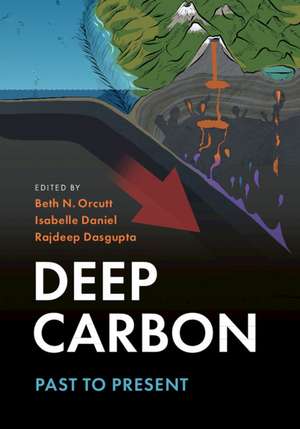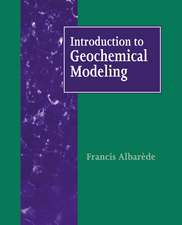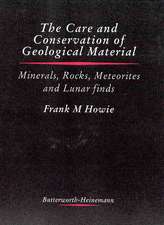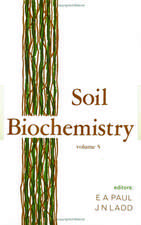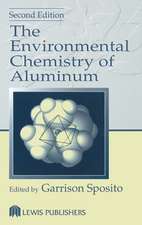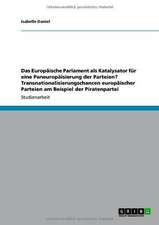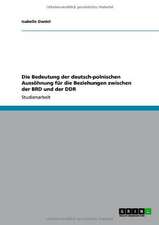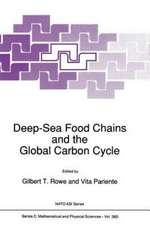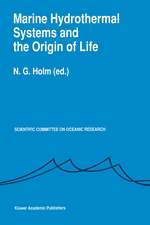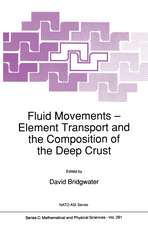Deep Carbon: Past to Present
Editat de Beth N. Orcutt, Isabelle Daniel, Rajdeep Dasguptaen Limba Engleză Hardback – 16 oct 2019
Preț: 574.30 lei
Preț vechi: 645.28 lei
-11% Nou
Puncte Express: 861
Preț estimativ în valută:
109.99€ • 113.32$ • 92.14£
109.99€ • 113.32$ • 92.14£
Carte disponibilă
Livrare economică 03-17 februarie
Preluare comenzi: 021 569.72.76
Specificații
ISBN-13: 9781108477499
ISBN-10: 1108477496
Pagini: 684
Ilustrații: 21 b/w illus. 140 colour illus.
Dimensiuni: 183 x 255 x 33 mm
Greutate: 1.45 kg
Editura: Cambridge University Press
Colecția Cambridge University Press
Locul publicării:Cambridge, United Kingdom
ISBN-10: 1108477496
Pagini: 684
Ilustrații: 21 b/w illus. 140 colour illus.
Dimensiuni: 183 x 255 x 33 mm
Greutate: 1.45 kg
Editura: Cambridge University Press
Colecția Cambridge University Press
Locul publicării:Cambridge, United Kingdom
Cuprins
1. Introduction to Deep Carbon: Past to Present Beth N. Orcutt, Isabelle Daniel, Rajdeep Dasgupta, Darlene Trew Crist and Marie Edmonds; 2. Origin and early differentiation of carbon and associated life-essential volatile elements on Earth Rajdeep Dasgupta and Damanveer S. Grewal; 3. Carbon versus other light elements in Earth's Core Jie Li, Bin Chen, Mainak Mookherjee and Guillaume Morard; 4. Carbon-bearing phases throughout Earth's interior: evolution through space and time Vincenzo Stagno, Valerio Cerantola, Sonja Aulbach, Sergey Lobanov, Catherine A. McCammon and Marco Merlini; 5. Diamonds and the mantle geodynamics of carbon: deep mantle carbon evolution from the diamond record Steven B. Shirey, Karen V. Smit, D. Graham Pearson, Michael J. Walter, Sonja Aulbach, Frank E. Brenker, Hélène Bureau, Antony D. Burnham, Pierre Cartigny, Thomas Chacko, Daniel J. Frost, Erik H. Hauri, Dorrit E. Jacob, Steven D. Jacobsen, Simon C. Kohn, Robert W. Luth, Sami Mikhail, Oded Navon, Fabrizio Nestola, Paolo Nimis, Evan M. Smith, Thomas Stachel, Vincenzo Stagno, Andrew Steele, Emilie Thomassot, Andrew R. Thomson and Yakov Weiss; 6. CO2-rich melts in the Earth Gregory Yaxley, Sujoy Ghosh, Ekaterina Kiseeva, Ananya Mallik, Carl Spandler, Andrew R. Thomson and Michael J. Walter; 7. The link between physical and chemical properties of carbon-bearing melts and its application for geophysical image of the Earth's mantle Fabrice Gaillard, Nicolas Sator, Emmanuel Gardes, Bertrand Guillot, Malcolm Massuyeau, David Sifré, Tahar Hammouda and Guillaume Richard; 8. Carbon dioxide emissions from subaerial volcanic regions: two decades in review Cynthia Werner, Tobias P. Fischer, Alessandro Aiuppa, Marie Edmonds, Carlo Cardellini, Simon Carn, Giovanni Chiodini, Elizabeth Cottrell, Mike Burton, Hiroshi Shinohara and Patrick Allard; 9. Carbon in the convecting mantle Erik H. Hauri, Elizabeth Cottrell, Katherine A. Kelley, Jonathan M. Tucker, Kei Shimizu, Marion Le Voyer, Jared Marske and Alberto E. Saal; 10. How do subduction zones regulate the carbon cycle? Matthieu Emmanuel Galvez and Manuel Pubellier; 11. A framework for understanding whole Earth carbon cycling Cin-Ty A. Lee, Hehe Jiang, Rajdeep Dasgupta and Mark Torres; 12. The influence of nanoporosity on the behavior of carbon-bearing fluids David Cole and Alberto Striolo; 13. A two-dimensional perspective on CH4 isotope clumping: distinguishing process from source Edward D. Young; 14. Earth as organic chemist Everett Shock, Christiana Bockisch, Charlene Estrada, Kristopher Fecteau, Ian R. Gould, Hilairy Hartnett, Kristin Johnson, Kirtland Robinson, Jessie Shipp and Lynda Williams; 15. New perspectives on abiotic organic synthesis and processing during hydrothermal alteration of the oceanic lithosphere Muriel Andreani and Bénédicte Ménez; 16. Carbon in the deep biosphere: forms, fates, and biogeochemical cycling Susan Q. Lang, Magdalena R. Osburn and Andrew D. Steen; 17. Biogeography, ecology and evolution of deep life Cara Magnabosco, Jennifer F. Biddle, Charles S. Cockell, Sean P. Jungbluth and Katrina I. Twing; 18. The genetics, biochemistry, and biophysics of carbon cycling by deep life Karen G. Lloyd, Cody S. Sheik, Bertrand Garcia-Moreno and Catherine A. Royer; 19. Energy limits for life in the subsurface Doug LaRowe and Jan Amend; 20. Deep carbon through deep time: data-driven insights Robert M. Hazen, Yana Bromberg, Robert T. Downs, Ahmed Eleish, Paul G. Falkowski, Peter Fox, Donato Giovannelli, Daniel R. Hummer, Grethe Hystad, Joshua J. Golden, Andrew H. Knoll, Congrui Li, Chao Liu, Eli K. Moore, Shaunna M. Morrison, A. D. Muscente, Anirudh Prabhu, Jolyon Ralph, Michelle Y. Rucker, Simone E. Runyon, Lisa A. Warden and Hao Zhong.
Recenzii
'An outstanding compilation of current knowledge about essentially all aspects of carbon within the Earth. The book results from 10 years of integrated research by an international group of leading scientists representing the fields of geoscience, biology, materials science, physics, and chemistry … The book is well illustrated, has a thorough index, and includes extensive references and classroom questions at the end of each chapter. This is an excellent resource for upper-level students along with professional scientists interested in any aspect of the Earth's carbon system.' M. E. McCallum, Choice
Descriere
A comprehensive guide to carbon inside Earth – its quantities, movements, forms, origins, changes over time and impact on planetary processes. This title is also available as Open Access on Cambridge Core.
